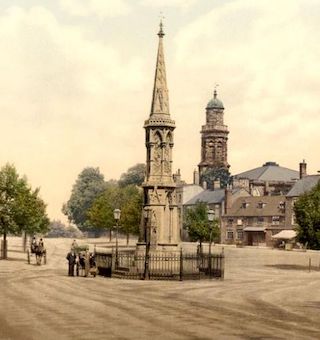Ride a cock-horse to Banbury Cross
What's the meaning of the phrase 'Ride a cock-horse to Banbury Cross'?
'Ride a cock-horse to Banbury Cross' is a line from a nursery rhyme. The original meaning is unknown and may simply be a nonsense rhyme.
What's the origin of the phrase 'Ride a cock-horse to Banbury Cross'?
If we are to find the origin of 'ride a cock-horse to Banbury Cross' it will be helpful to look at the nursery rhyme that the line comes from. The best known version of that rhyme is:
Ride a cock-horse to Banbury Cross,
To see a fine lady upon [or 'ride on'] a white horse;
Rings on her fingers and bells on her toes,
And she shall have music wherever she goes
 Clearly we'll need to find out what a 'cock-horse' and Banbury Cross are. The second part is the easiest - Banbury Cross is a cross in the English town of Banbury - that could hardly be simpler. There were several medieval crosses in Banbury until 1600 when they were demolished by Puritans. The present Banbury Cross was erected in 1859, after the rhyme was already well-known.
Clearly we'll need to find out what a 'cock-horse' and Banbury Cross are. The second part is the easiest - Banbury Cross is a cross in the English town of Banbury - that could hardly be simpler. There were several medieval crosses in Banbury until 1600 when they were demolished by Puritans. The present Banbury Cross was erected in 1859, after the rhyme was already well-known.
A 'cock-horse' is the name of a child's toy hobby horse, or a stick representing one, or an adult's foot or knee used to jog a child up and down as a pretend horse ride. From the late 16th century, 'cock-horse' was also used as the name of a high-spirited stallion, although all of the early citations of the word in print refer to children and their games - for example, this piece from Thomas Elyot's Image of Gouernance, 1541:
The dotynge pleasure to se my litell sonne ryde on a cokhorse.
So, we can be sure that a cock-horse had two legs not four. What was being referred to in the nursery rhyme, and why the child might be taken to Banbury, is unclear - not least because there were many early variations of the wording of the rhyme. The earliest known version is found in Tommy Thumb's Pretty Song Book, circa 1744:
Ride a cock-horse To Banbury Cross,
To see what Tommy can buy;
A penny white loaf,
A penny white cake,
And a two-penny apple-pie.
The earliest citation of the version we use know, albeit slightly changed, is found in the English author Joseph Ritson's collection of rhymes - Gammer Gurton's Garland or The Nursery Parnassus, which was printed in London in 1784 for 'good children who can neither read nor run':
RIDE a cock horse, to Banbury cross,
To see an old woman get up on her horse;
Rings on her fingers, and bells at her toes,
And so she makes music wherever she goes.
How 'old woman' mutated into 'fine lady' we don't now know. That ‘fine lady’ has been variously identified as Queen Elizabeth I, Lady Godiva (in a version of the rhyme referring to Coventry Cross), and the traveller Celia Fiennes (1662–1741) - Fiennes' being corrupted as 'fine'. None of these are supported by any evidence whatsoever.
The truth is that the meaning of the words is now lost to us. It's not what we want to hear but, like most nursery rhymes, the words of 'Ride a cock-horse' are probably nonsense.
See also:

